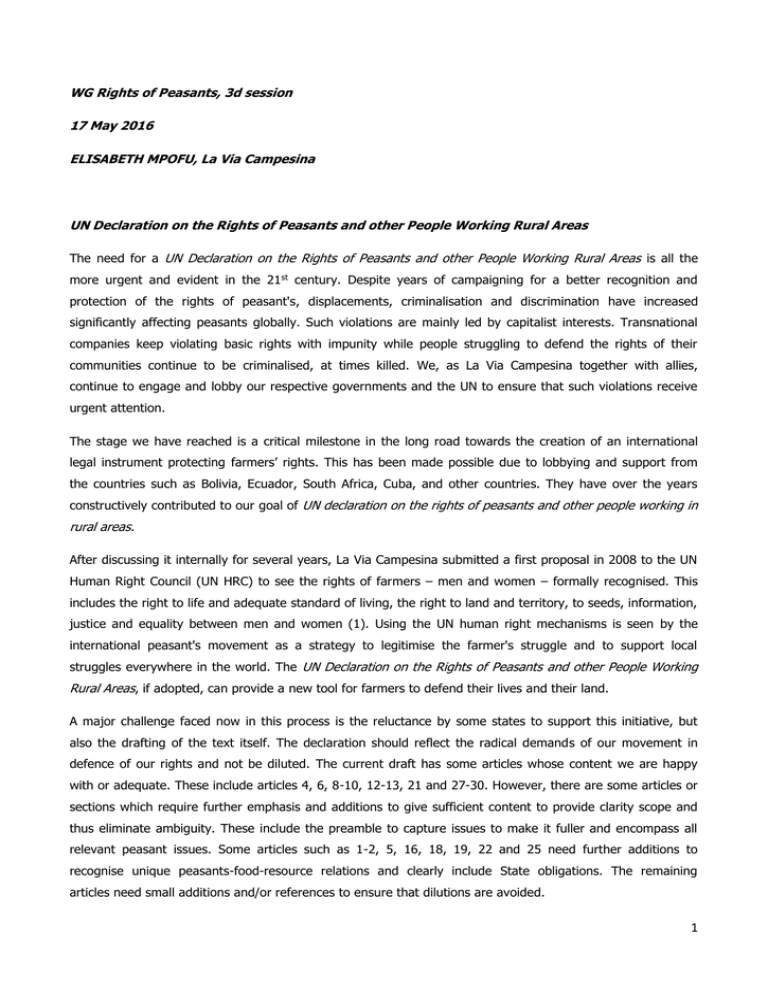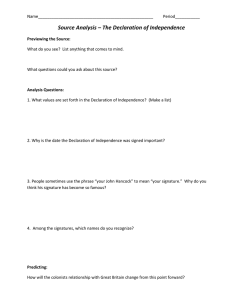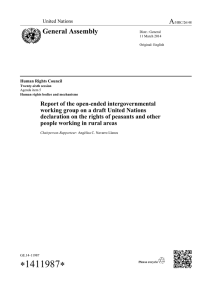WG Rights of Peasants, 3d session 17 May 2016
advertisement

WG Rights of Peasants, 3d session 17 May 2016 ELISABETH MPOFU, La Via Campesina UN Declaration on the Rights of Peasants and other People Working Rural Areas The need for a UN Declaration on the Rights of Peasants and other People Working Rural Areas is all the more urgent and evident in the 21st century. Despite years of campaigning for a better recognition and protection of the rights of peasant's, displacements, criminalisation and discrimination have increased significantly affecting peasants globally. Such violations are mainly led by capitalist interests. Transnational companies keep violating basic rights with impunity while people struggling to defend the rights of their communities continue to be criminalised, at times killed. We, as La Via Campesina together with allies, continue to engage and lobby our respective governments and the UN to ensure that such violations receive urgent attention. The stage we have reached is a critical milestone in the long road towards the creation of an international legal instrument protecting farmers’ rights. This has been made possible due to lobbying and support from the countries such as Bolivia, Ecuador, South Africa, Cuba, and other countries. They have over the years constructively contributed to our goal of UN declaration on the rights of peasants and other people working in rural areas. After discussing it internally for several years, La Via Campesina submitted a first proposal in 2008 to the UN Human Right Council (UN HRC) to see the rights of farmers – men and women – formally recognised. This includes the right to life and adequate standard of living, the right to land and territory, to seeds, information, justice and equality between men and women (1). Using the UN human right mechanisms is seen by the international peasant's movement as a strategy to legitimise the farmer's struggle and to support local struggles everywhere in the world. The UN Declaration on the Rights of Peasants and other People Working Rural Areas, if adopted, can provide a new tool for farmers to defend their lives and their land. A major challenge faced now in this process is the reluctance by some states to support this initiative, but also the drafting of the text itself. The declaration should reflect the radical demands of our movement in defence of our rights and not be diluted. The current draft has some articles whose content we are happy with or adequate. These include articles 4, 6, 8-10, 12-13, 21 and 27-30. However, there are some articles or sections which require further emphasis and additions to give sufficient content to provide clarity scope and thus eliminate ambiguity. These include the preamble to capture issues to make it fuller and encompass all relevant peasant issues. Some articles such as 1-2, 5, 16, 18, 19, 22 and 25 need further additions to recognise unique peasants-food-resource relations and clearly include State obligations. The remaining articles need small additions and/or references to ensure that dilutions are avoided. 1 This meeting is a critical next step in our negotiation of the draft declaration during this week of May 2016 in the Open-ended Intergovernmental Working Group (OEIWG). The Via Campesina team responsible will during this week table proposals for inclusion in the draft text and present to the UN institution the reality of the human rights violations that farmers face on a daily basis. I would like to recognise those organisations which have worked with us all these years. La Via Campesina international collective on peasants rights is working closely with allies to lead this process. Our closer partners on this issue are FIAN International (Foodfirst Information and Action Network) and CETIM (the Europe-Third World Centre). Many other organizations are have also been constructively engaging in this initiative, from workers, indigenous, nomads, fisher folk, NGOs, etc (including The International Union of Food, Agricultural, Hotel, Restaurant, Catering, Tobacco and Allied Workers' Associations (IUF), World Forum of Fisher Peoples (WFFP), The World Alliance of Mobile Indigenous Peoples (WAMIP), International Indian Treaty Alliance (IITF), Federation of Rural Adult Catholic Movements (FIMARC), Centro de Estudios Legales y Sociales (CELS). Furthermore, hundreds of million people (including over 200 million in La Via Campesina) are actively waiting for this process. We have recently been holding consultations within LVC (just ended midterm conference in Turkey; regional consultation in South East-East Asia and many at national levels). We therefore hope that States will come to agreement to realize the declaration. Now we see that the support is growing judging on the latest resolution and OEIWG where more and more States show their willingness to support the declaration. Let’s take full advantage of these opportunities to finish the declaration. I wish to encourage you all to fully apply yourselves in this process to ensure that we have a draft that truly represents peasants issues. Thank you. 2



